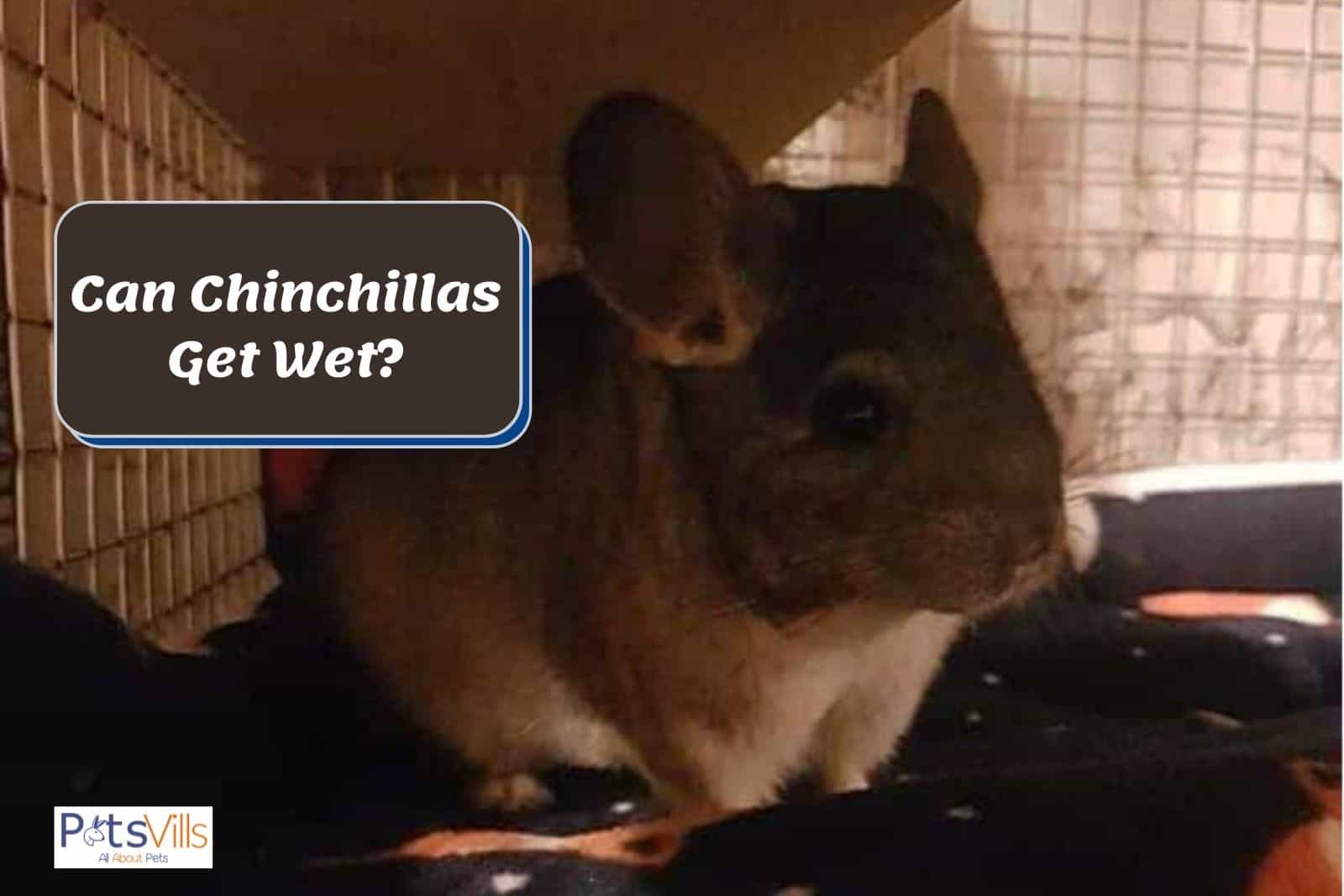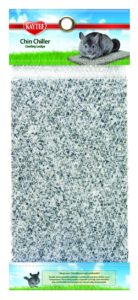Chinchillas have very thick fur and have up to 80 hairs per hair follicle.
They wash by bathing in dust baths, which remove excessive dirt and oils that are on the chinchilla’s coat.
But can they take real baths in water?
Read on to find out why the answer is a very solid “NO.”
Check: Do Chinchillas Make Good Pets?
Table of Contents
Can Chinchillas Get Wet?
Chinchillas should never be put in water. Chinchillas have very thick fur and it can take them a while to dry. Getting a chinchilla wet can cause serious health issues.
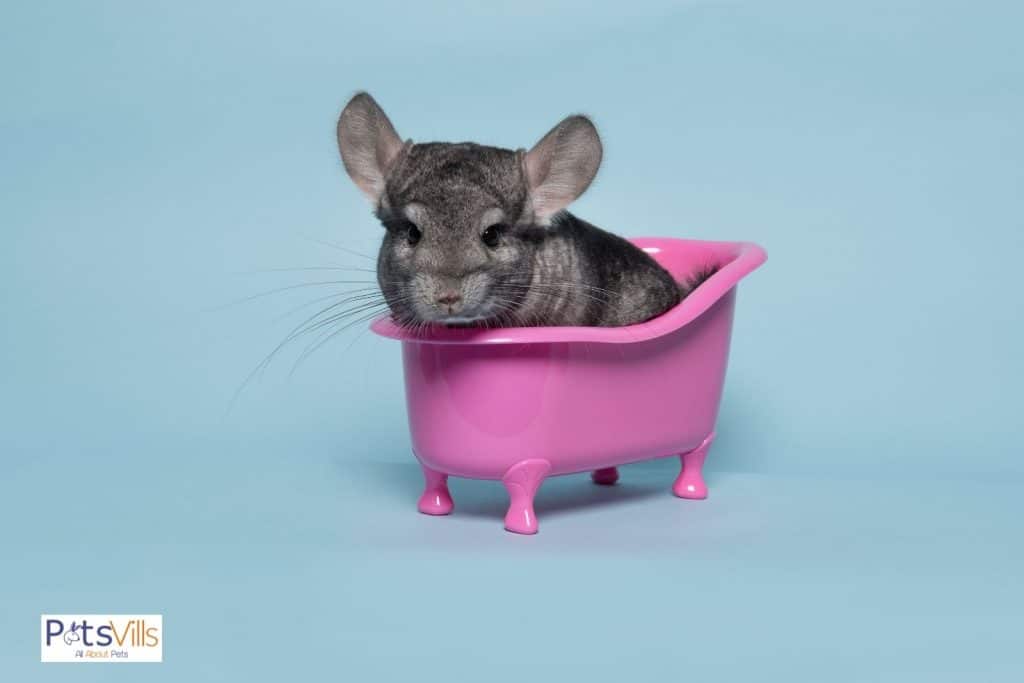
When chinchillas are wet they will lose body heat very fast and become too chilled which can make them vulnerable to different diseases.
Unlike other animals that have water-resistant coats, chinchillas have very thick fur coats that will absorb water for a very long time. Getting a chinchilla wet can cause skin irritation and reduce their body temperate which can cause them to become ill.
If your chinchilla becomes wet, dry them immediately with a towel, and ensure they have been fully dried before putting them back in their cage.
If your chinchilla remains wet for a long time, bacteria may start to begin to grow inside their fur, which can cause them to become sick.
Why Can’t Chinchillas Get Wet?
You should never get your chinchilla wet. Here are the two main reasons why:
Body Temperature
Chinchillas cannot regulate their body temperature that well. Therefore their environment needs to be the correct temperature.
If you keep your chinchilla in temperatures above 75f, it may be deadly to the rodent as they might overheat.
Chinchillas do not have sweat glands as humans do, therefore they can’t cool themselves down as fast.
If your chinchilla is too hot, consider putting a stone mat in their cage that they can lie on. Stone is usually colder than the room temperate and will help cool them down. You can buy stones for chinchillas online!
Chinchillas also do not do well in cold conditions.
If the fur is still wet, then they might not be able to regulate their body temperatures, which may result in serious issues. Therefore try not to get your chinchilla wet!
Fungal Infections
Chinchillas have very thick fur. Their coat is dense, which provides the perfect environment for fungus to thrive, especially when they get wet. If you bathe your chinchilla in water, they will definitely get fungus and serious skin complications.
What Should I Do If My Chinchillas Gets Wet?
First, do not panic! Do not rush to the vets just yet.
If a splash of water gets on the chinchilla fur, deal with it at home.
Get a piece of cloth and try to dry the chinchilla as much as you can. This will remove most of the water.
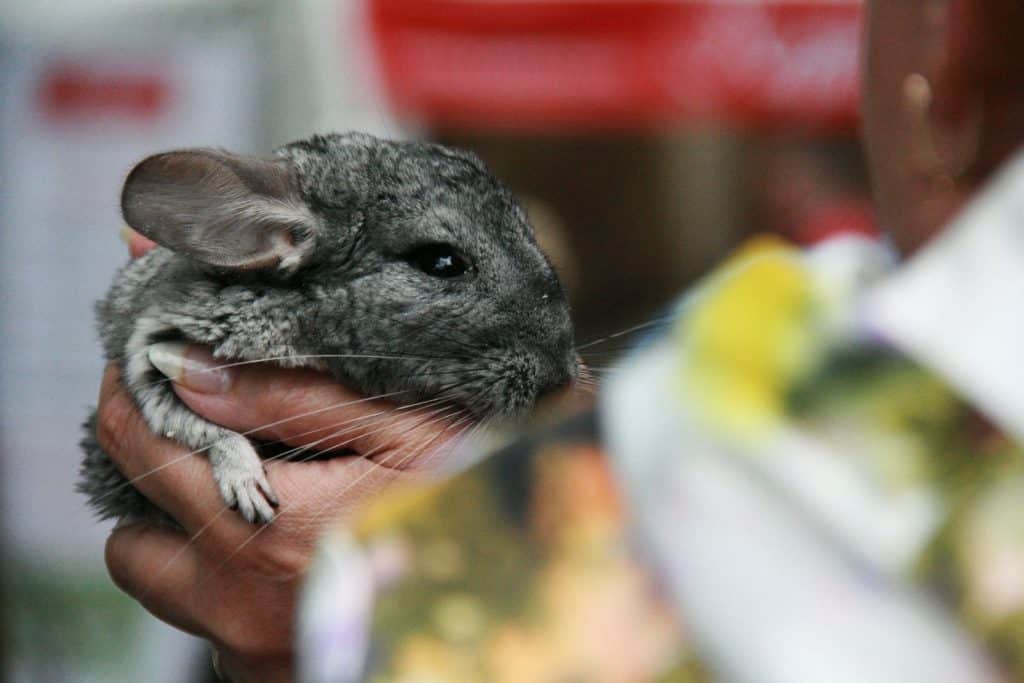
Be gentle on your chinchilla, you don’t want to hurt them.
Do not use a hairdryer on your chinchilla as it will overheat them! Repeat the above procedure until the water has completely dried.
If your chinchilla experience side effects once they get in contact with water, take them to the vets as soon as possible.
If you do not know how to clean your chinchilla, never use water but rather bath their dust baths. You need to find dust that is especially for chinchillas. This will clean any dirt or oils from their fur.
When chinchillas get wet, they look tiny and alienated. The ears and feet remain huge while the rest of the body is clumped together.
Use a towel to dry as much water from the chinchilla’s fur. Make sure to dry the ears to stop ear mites. Once you are done with drying, allow the chinchilla to take a dust bath. Do not dust the chinchilla while they are still moist because it can create matting issues. It will cause the fur to clump together.
Prior to the next bath, use a bigger comb to loosen areas that are mat up and lift up the hair. Dust the fur every day until it is back to normal. Be careful when combing so that you do not remove the remaining hair, as fur slips can occur.
How to Make Sure Your Chinchilla Doesn’t Get Wet Again
Here are some tips to make sure your chinchilla never gets wet.
Always keep your chinchilla far from a bowl or puddle of water. Keeping a water bottle in their cage is fine, but it shouldn’t be enough water to get them covered in water.
Avoid placing water cups in your chinchilla’s cage. Instead, use water bottles. This will keep your chinchilla healthy and safe.
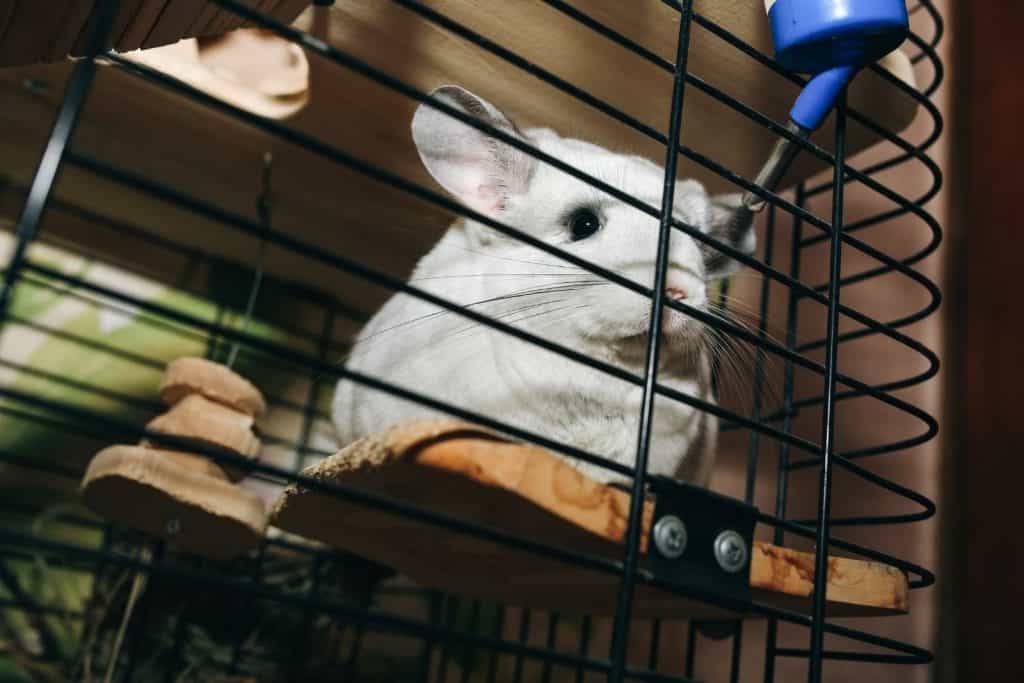
You should keep your chinchillas away from water.
How Do Chinchillas Keep Their Fur Clean?
Dust Baths
Chinchillas clean themselves in dust baths. They clean themselves by rolling in the dust. The dust will remove excess oils and dirt that are on the chinchilla’s fur coat.
They require a dust bath twice to three times per week. Make sure not to over bath your chinchilla as it can cause their fur to become too dry and unhealthy.
Chinchillas love taking dust baths and watching them rolling in the dust is quite therapeutic. (For both the chinchilla and you!).
The fur of chinchillas is the densest in the world. A square centimeter of skin can hold as much as 20,000 hairs.
Chinchillas take dust bathe to clean themselves. The dust absorbs dirt and oil in the fur which later shakes off. Chinchillas do not need to be cleaned with water.
Grooming
Chinchillas will also groom themselves to keep their fur clean and healthy. You do not need to groom chinchillas as you would with other animals. Some chinchilla owners like to groom their chinchilla but not all chinchillas will like it.
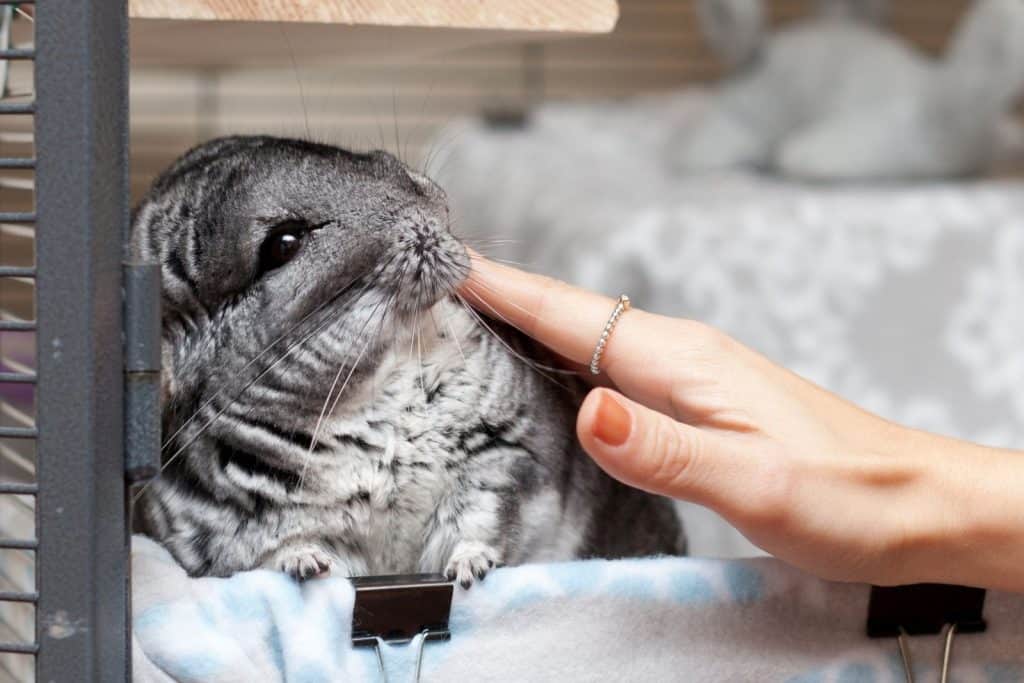
You need to change the dust regularly to make sure it is clean. You can use the same dust twice or three times. Just make sure your chinchilla hasn’t pooped in it!
Chinchillas do need wet baths to keep themselves clean.
Getting wet for chinchillas is dangerous. They would lose body heat very fast and become too chilled which would make them vulnerable to different diseases.
The hair of a chinchilla is different from the hair of other pets. Each hair follicle has about 80 hairs (some have more!) which is a lot more than another pet hair follicle has.
Chinchilla Grooming Tips
Grooming can help reduce the amount of fur that will be shed, cutting down on the mess, matting, dirt, and dander. It also makes your chinchilla appearance look better. Read more about “Do Chinchilla Shed?”
Most chinchillas don’t like to be groomed.
Grooming your chinchilla isn’t essential as long as your chinchilla is not kept in an area where dirt and allergens are a problem.
Most chinchillas will groom themselves.
Chinchillas require regular bathing in a special substance called chinchilla dust. A good quality chinchilla dust is a natural powder that is used to penetrate the dense fur of a chinchilla. It works to protect their coat by removing excess oils and moisture.
Never bathe your chinchilla in water.
If your pet becomes frightened by the water, this can cause ‘fur slip’ which means they will drop hair as a natural defense against predators. If they get wet for any reason, it may cause fungus to grow beneath their fur as their fur is so dense that it cannot dry sufficiently on its own.
If they do get wet, take care to dry them thoroughly to avoid fungus and mold growth.
READ MORE: Are Chinchillas Stinky?
If you’re looking for adorable and unique names for your chinchilla, you definitely don’t want to miss out on the “chinchilla names” video below – it’s sure to inspire you:
FAQs
What kind of chinchilla dust should I buy?
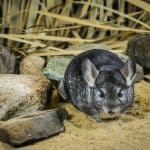
You need to buy a special type of dust that is meant for chinchillas. Avoid low-quality dust because it can cause serious issues for your chinchilla including scratching and itching.
Do chinchillas get wet in the wild?
Chinchillas rarely get wet in the wild. The areas that wild chinchillas live in are high elevations and rarely see rain. They bathe in volcanic dust.
Can you bathe chinchillas?
You cannot bath chinchillas because they do not require water to be clean. Chinchillas take dust baths instead.
References
- A-Z Animals – The Wonders of Nature. 2021. “Chinchilla.” AZ Animals. September 26, 2021. https://a-z-animals.com/animals/chinchilla/.
- Bradford, Alina. 2014. “Chinchilla Facts.” Livescience.com. Live Science. July 21, 2014. https://www.livescience.com/28131-chinchillas.html.
- PetMD Editorial. 2017. “Common Illnesses in Chinchillas.” Petmd.com. PetMD. December 21, 2017. https://www.petmd.com/exotic/care/common-illnesses-chinchillas.
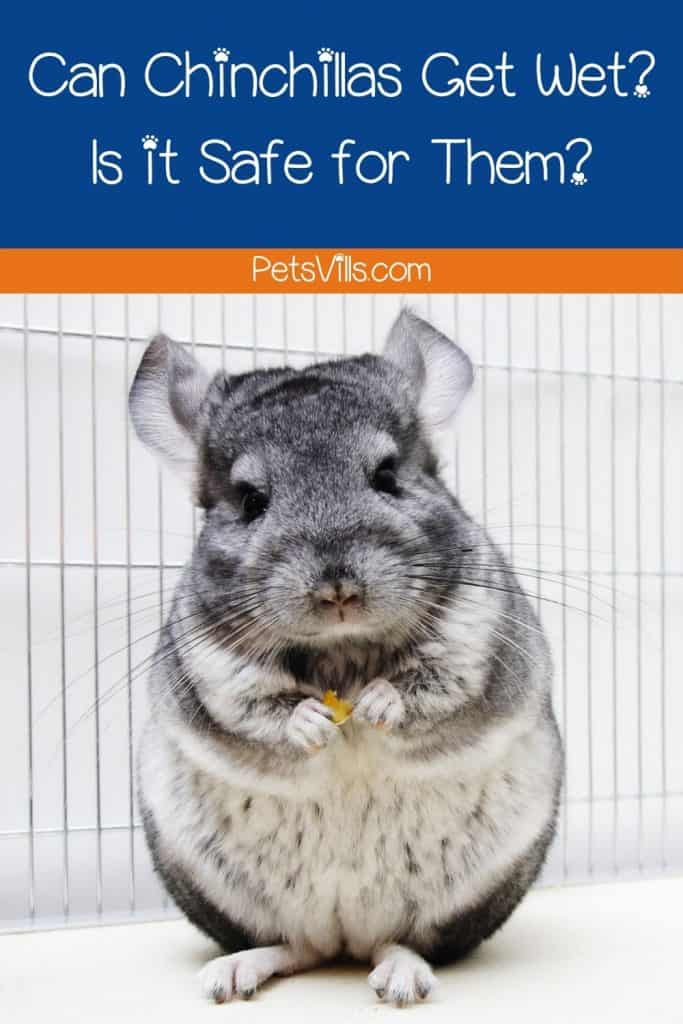
Can chinchillas get wet? Please share your opinion on this topic below!
Alina Hartley is a small-town girl with a ginormous love of bearded dragons. It all started with Winchester, a baby bearded who was abandoned at the shelter by his former owners because of a birth defect that caused one front leg to be shorter than the other. Alina originally went to the shelter looking for a guinea pig, but one look at Winchester and it was love at first sight. From that day on, Alina has dedicated her life to learning everything she can about bearded dragons. She loves helping new beardie parents start their incredible journey with these magnificent reptiles.
Follow her on:
LINKEDIN
TWITTER.
Read her latest articles HERE
Learn more about her HERE.

